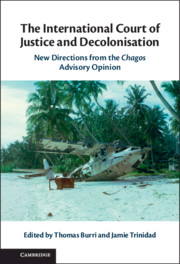 The International Court of Justice and Decolonisation
The International Court of Justice and Decolonisation Book contents
- The International Court of Justice and Decolonisation
- The International Court of Justice and Decolonisation
- Copyright page
- Contents
- Figures
- Tables
- Contributors
- Acknowledgements
- Table of Cases and Awards
- Table of Legislation
- UN General Assembly Resolutions
- National Legislation
- Abbreviations
- 1 Introduction
- 2 Chagos, Custom and the Interpretation of UN General Assembly Resolutions
- 3 Reflections on the Treatment of General Assembly Resolutions in the Chagos Advisory Opinion
- 4 The Chagos Advisory Opinion and the Principle of Consent to Adjudication
- 5 Two Takes on Chagos: Reconciling the Advisory Opinion with the Res Judicata Effect of the UNCLOS Arbitral Award
- 6 State Responsibility in Advisory Proceedings: Thoughts on Judicial Propriety and Multilateralism in the Chagos Opinion
- 7 Peremptory Norms in the Advisory Opinion of the International Court of Justice on the Decolonisation of Mauritius and the Chagos Archipelago
- 8 Reflections on the UK’s Assertion of Sovereignty over the Chagos Archipelago in the Wake of the Chagos Advisory Opinion
- 9 The Chagos Marine Protected Area
- 10 Human Rights and the Chagos Advisory Opinion
- 11 Heightened Scrutiny of Colonial Consent According to the Chagos Advisory Opinion: Pandora’s Box Reopened?
- 12 Chagos and the Perplexities of the Law of Treaties
- 13 Prospect of the Chagos Advisory Opinion and the Subsequent UN General Assembly Resolution Helping to Resolve the Future of the Chagos Archipelago and Its Former Inhabitants: A Political Perspective
- 14 Reflections on the Human Tragedy Underlying the Chagos Case and the Way Forward
- Index
7 - Peremptory Norms in the Advisory Opinion of the International Court of Justice on the Decolonisation of Mauritius and the Chagos Archipelago
Published online by Cambridge University Press: 13 February 2021
- The International Court of Justice and Decolonisation
- The International Court of Justice and Decolonisation
- Copyright page
- Contents
- Figures
- Tables
- Contributors
- Acknowledgements
- Table of Cases and Awards
- Table of Legislation
- UN General Assembly Resolutions
- National Legislation
- Abbreviations
- 1 Introduction
- 2 Chagos, Custom and the Interpretation of UN General Assembly Resolutions
- 3 Reflections on the Treatment of General Assembly Resolutions in the Chagos Advisory Opinion
- 4 The Chagos Advisory Opinion and the Principle of Consent to Adjudication
- 5 Two Takes on Chagos: Reconciling the Advisory Opinion with the Res Judicata Effect of the UNCLOS Arbitral Award
- 6 State Responsibility in Advisory Proceedings: Thoughts on Judicial Propriety and Multilateralism in the Chagos Opinion
- 7 Peremptory Norms in the Advisory Opinion of the International Court of Justice on the Decolonisation of Mauritius and the Chagos Archipelago
- 8 Reflections on the UK’s Assertion of Sovereignty over the Chagos Archipelago in the Wake of the Chagos Advisory Opinion
- 9 The Chagos Marine Protected Area
- 10 Human Rights and the Chagos Advisory Opinion
- 11 Heightened Scrutiny of Colonial Consent According to the Chagos Advisory Opinion: Pandora’s Box Reopened?
- 12 Chagos and the Perplexities of the Law of Treaties
- 13 Prospect of the Chagos Advisory Opinion and the Subsequent UN General Assembly Resolution Helping to Resolve the Future of the Chagos Archipelago and Its Former Inhabitants: A Political Perspective
- 14 Reflections on the Human Tragedy Underlying the Chagos Case and the Way Forward
- Index
Summary
When negotiating states introduced the notion of peremptory norms or ius cogens norms into the 1969 Vienna Convention on the Law of Treaties (VCLT), they foresaw a specific mechanism for settling disputes that referred to an alleged breach of a peremptory norm of general international law (ius cogens norm) as grounds for voiding or terminating a treaty, circumstances specifically provided for in Articles 53 and 64 of the Convention. Indeed, paragraph (a) of Article 66 provides that such disputes should be submitted to arbitration or to the International Court of Justice (ICJ).1 It was considered appropriate, therefore, that when settling such disputes, courts should address the question of how the effects of peremptory norms of general international law specifically apply to treaties.2
- Type
- Chapter
- Information
- The International Court of Justice and DecolonisationNew Directions from the Chagos Advisory Opinion, pp. 117 - 143Publisher: Cambridge University PressPrint publication year: 2021
